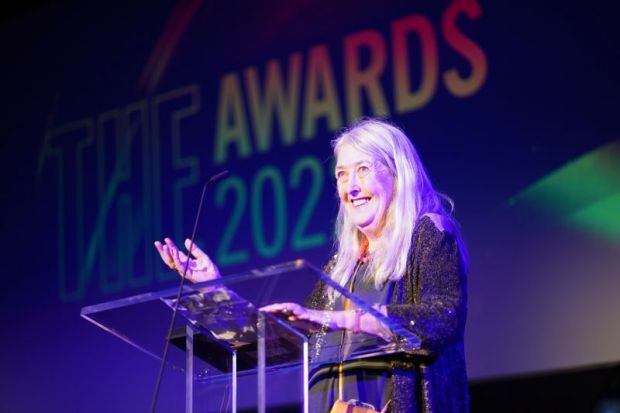UK universities face a “bonfire of the humanities” that must be resisted by the sector, according to Dame Mary Beard.
Speaking at this year’s Times Higher Education Awards as she accepted the THE Outstanding Achievement Award, the recently retired professor of Classics at the University of Cambridge warned that the humanities must not be seen as “a vanity project that we only support when the going is good”.
The intervention came after a slew of job cuts and course closures across England led the University and College Union to warn that attacks on the arts and humanities were becoming “endemic”, and as the Westminster policy focus on graduate employment pushes institutions to prioritise the sciences for investment.
“It does begin to look as if we are going to face what you might call a ‘bonfire of the humanities’ and I think that everyone in the higher education sector needs to start to shout and argue very cogently that facing the future successfully demands arts research and teaching, as well as science,” Dame Mary said. “We need arts and humanities to help us think about the ways that we can process the information that comes to us.”
Birkbeck, University of London was the most recent institution to announce job cuts, with up to 140 roles thought to be at risk. Departments such as English, geography, politics, philosophy and languages are set to be particularly hard-hit.
Other institutions which have announced cuts to their arts and humanities provision this year include Huddersfield, Wolverhampton, De Montfort and Roehampton universities.
Dame Mary, renowned for her television series and public commentary, added: “While I am in retirement, I am going to make my slogan to everybody: the humanities are not a vanity project that we only support when the going is good. They are essential.”
Speaking at the event in London, Dame Mary quipped that she was accepting the THE award “on behalf of colleagues who prove that Classics isn’t only for posh white boys”. She has pledged an £80,000 retirement gift to Cambridge fund the living costs of two Classics students from ethnic minority backgrounds.
But, speaking on the eve of sector-wide strike action by UCU members over pay, pensions and working conditions, Dame Mary acknowledged that she had some concerns for the future of the sector, particularly for young academics who faced the insecurity of moving from one short-term contract to another.
While some dons at the University of Oxford continue to fight its compulsory retirement policy, Dame Mary said she was happy to make space for someone new at Cambridge after four decades at the institution, which similarly requires academics to step down at 67.
“I can’t say that I’m not retiring without some fears for the future, whether that’s pensions or the ‘precariat’,” Dame Mary said.
“I think, honestly, that what we have today in the shape of the precariat is absolutely no way to construct a first step in an academic career for any young academic.
“One of the reasons I feel pleased to be retiring is that I won’t have to think of myself not as an NHS bed blocker but as a university job blocker. I hope that more young people can get in – I’ve had my go at this job, and it’s time to stand aside.”




